Substitute for Cucumber
When you need to replace cucumber in a recipe, several fresh vegetables can match its crisp texture and mild flavor. Celery offers a satisfying crunch with just 1 gram of carbs per stalk, while zucchini provides similar moisture content and versatility in both raw and cooked dishes. Jicama delivers a subtle sweetness and maintains its crunch, making it perfect for salads and slaws. Persian cucumbers offer the closest match in taste and texture, while radishes add a peppery kick and vibrant color. Each substitute brings its own unique nutritional benefits and culinary possibilities to your kitchen arsenal.
This post may contain affiliate links. If you make a purchase through these links, I may earn a commission at no additional cost to you. Additionally, portions of this post may be generated using artificial intelligence (AI) technology. While we strive for accuracy, please be aware that AI-generated content may not always be perfect and should be fact-checked when necessary.
The Spatula Scoops
- Celery provides a similar crunch to cucumber with only 1 gram of carbs per stalk and offers vitamins A, K, and C.
- Zucchini matches cucumber's texture and water content, containing just 4 grams of carbs per cup and works in salads.
- Persian cucumbers are smaller, sweeter alternatives that can be used interchangeably with regular cucumbers at a two-to-one ratio.
- Jicama delivers a sweet crunch with 5 grams of carbs per cup and maintains its texture when marinated or heated.
- Radishes offer a peppery alternative with minimal carbs, providing firmness and vibrant color to dishes requiring cucumber.
Fresh Alternatives for Every Dish
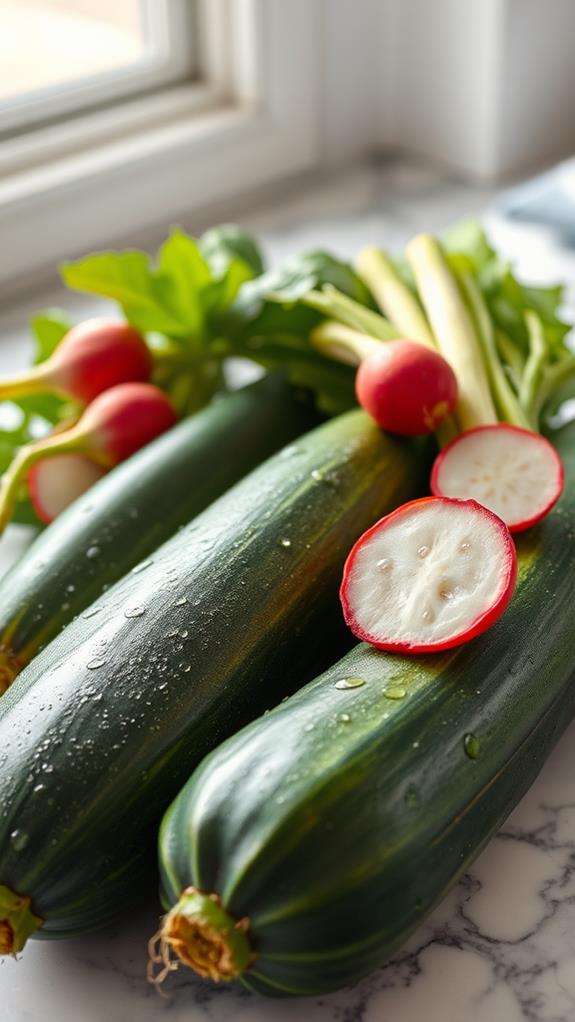
Versatility in the kitchen opens up a world of fresh alternatives when cucumbers aren't available. You'll find several fresh options that can seamlessly replace cucumbers in your favorite recipes, whether you're making a crisp salad or a rejuvenating cucumber sauce. To maintain freshness in your dish, consider how long various ingredients last, especially when using them in raw preparations; for example, fresh crab is best eaten within 1-2 days of storage. For a satisfying crunch, you can turn to celery, which offers a similar invigorating quality. Two stalks will give you the equivalent crunch and volume of one medium cucumber, making it perfect for salads and dips. If you're looking for something with comparable water content, zucchini proves to be an excellent substitute, matching the cucumber's texture in most recipes. Persian cucumbers offer a convenient alternative, as you won't need to peel them, and two of these smaller varieties can replace one standard cucumber.
When you want to experiment with different flavors, consider jicama, which brings a subtle sweetness along with its crisp texture. Half a jicama works perfectly in place of one cucumber. For a bolder choice, thinly sliced radishes add both visual appeal and a peppery kick to your dishes, providing an unexpected but delightful alternative.
Health Benefits of Cucumber Substitutes
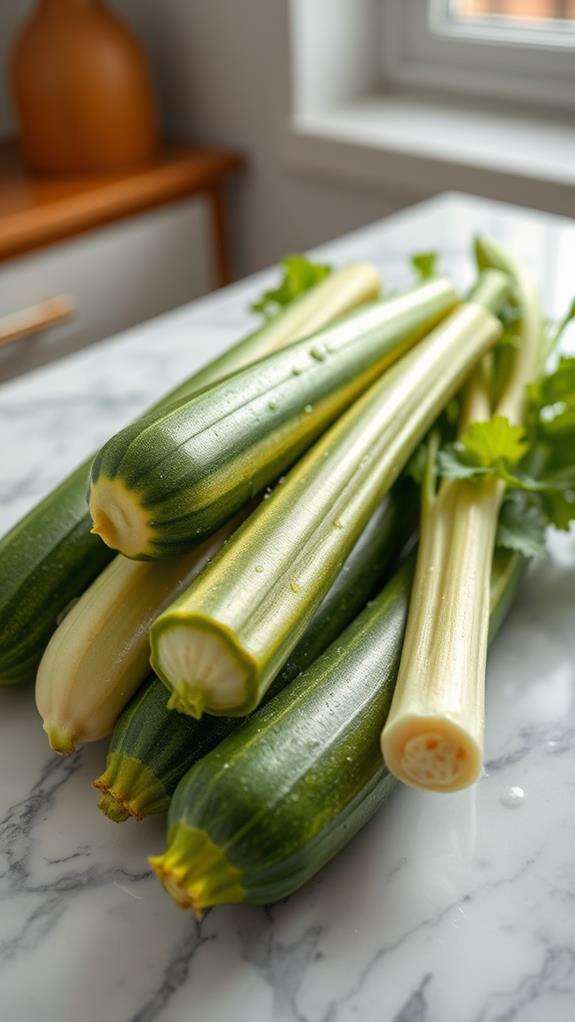
Beyond their culinary uses, cucumber substitutes offer impressive health benefits that can enhance your daily nutrition. When you're looking to diversify your diet, you'll find that alternatives like jicama deliver excellent fiber content while keeping your calorie intake low, supporting your digestive health and weight management goals. Additionally, many of these substitutes can be stored for extended periods, ensuring you have access to nutritious options whenever needed, much like how cooked chickpeas can last in your fridge for several days.
You'll discover that celery isn't just a crunchy snack; it's packed with essential vitamins A, K, and C, making it an excellent choice for boosting your immune system and maintaining healthy skin. Similarly, zucchini provides substantial hydration benefits due to its high water content, while delivering important nutrients like vitamin C and potassium that support your body's cellular functions.
If you're monitoring your nutrient intake, you'll appreciate that fennel offers both fiber and vitamin C, while potentially improving your digestion through its natural compounds. Don't overlook watermelon rind as a nutritious option; it's rich in vitamins and minerals that can support your overall health while providing that satisfying crunch you're seeking. These alternatives not only replace cucumbers effectively but also contribute unique nutritional profiles to your diet.
Crunchy Vegetables Worth Considering
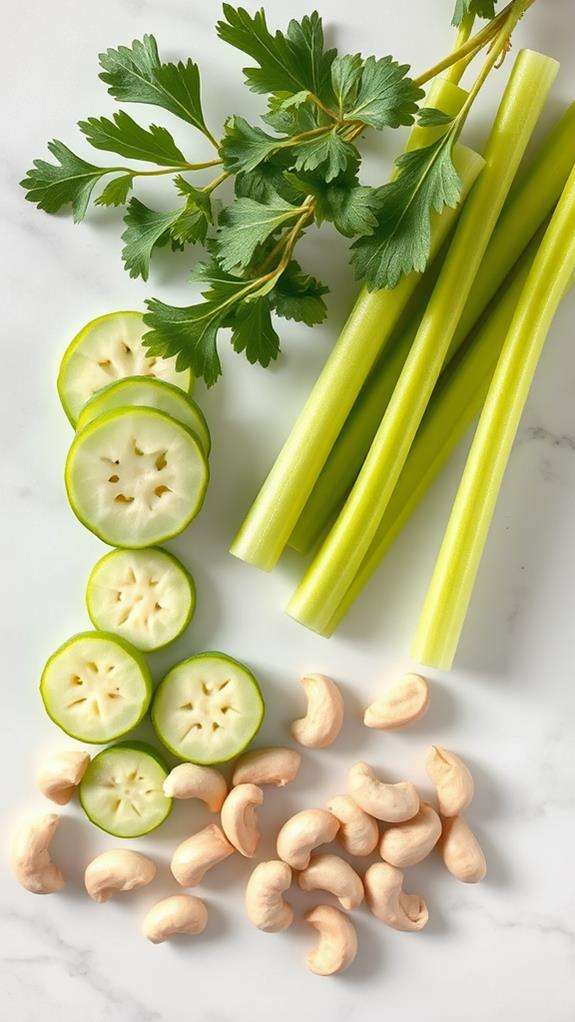
When you're seeking the perfect crunch in your dishes, understanding texture profiles can make all the difference in choosing cucumber alternatives that'll work best for your needs. Cold chicken can be a delightful addition to salads, offering a unique texture that pairs well with various crunchy vegetables; just verify it has been stored properly to avoid cold chicken safety guidelines. You'll find that vegetables like celery and jicama offer year-round availability with satisfying crispness, while seasonal options such as radishes and Persian cucumbers bring their own unique snap to your plate. Whether you're assembling a invigorating summer salad or creating winter crudités, these crunchy substitutes maintain their texture integrity even when mixed with dressings or stored in the refrigerator for several days.
Fresh Veggie Texture Guide
Searching for the perfect cucumber substitute often leads to discovering an array of equally crunchy vegetables. When you're exploring texture alternatives, you'll find that celery and jicama stand out as prime candidates, offering similar crispness and versatility in your favorite dishes. These alternatives don't just mimic cucumber's signature crunch; they bring their own unique characteristics to enhance your culinary creations.
- Zucchini delivers a tender-crisp bite when thinly sliced, making it perfect for salads and garnishes
- Celery provides that signature snap with added natural saltiness
- Jicama maintains its crunch even when marinated or dressed
- Radishes offer a firmer texture with a peppery punch
You'll notice that each vegetable brings its own textural profile while maintaining that satisfying crunch you're seeking. Carrots, for instance, provide a dense crispness that holds up well in various preparations, while zucchini offers a softer yet still distinct bite. When selecting your cucumber substitute, consider how the texture will complement your dish's other components, as each alternative brings its own unique mouthfeel and structural integrity to your recipes.
Seasonal Crunch Alternatives
Throughout the year, different vegetables step into the spotlight as perfect cucumber substitutes, each bringing its own seasonal charm and satisfying crunch. When you're looking to replace cucumber in your favorite recipes, celery offers a reliable year-round option with its distinctive snap and subtle peppery notes that work wonderfully in both salads and sandwiches.
During spring and summer months, you'll find radishes bringing their characteristic zip and firmness to your dishes, while jicama delivers a sweet crunch that's particularly invigorating when cut into sticks or cubes. If you're working with Middle Eastern recipes, Persian cucumbers provide a sweeter, more concentrated flavor than their common counterparts, and you won't need to peel them.
For autumn and winter alternatives, bell peppers step in as a colorful substitute that maintains that desired crispness while adding a mild sweetness to your dishes. You'll find their versatility particularly useful in salads where texture plays a key role. Each of these alternatives brings its own unique properties to your recipes, ensuring you'll never miss the traditional cucumber's crunch.
Best Picks for Salads
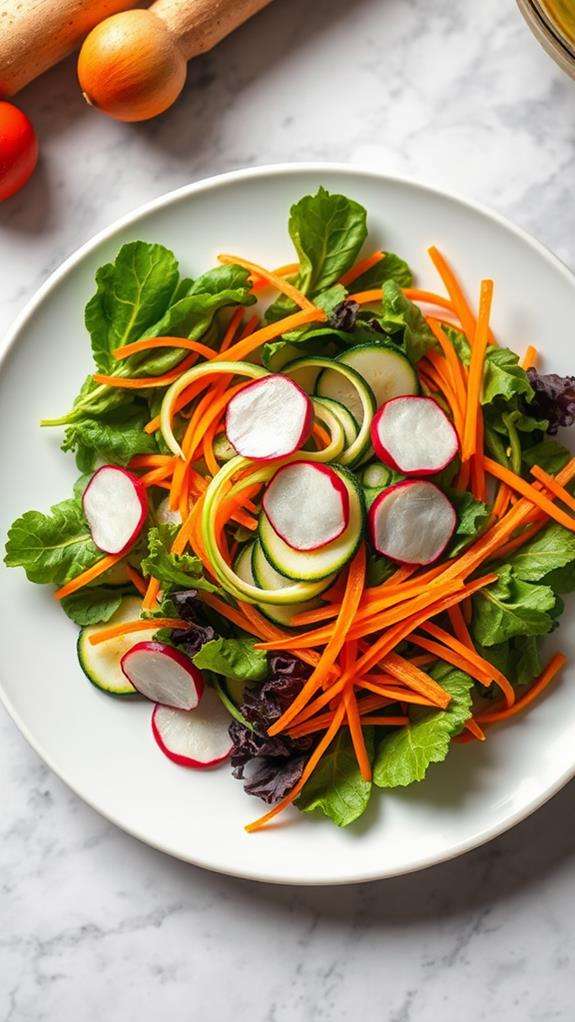
A vibrant salad doesn't need cucumbers to deliver that sought-after crunch and vitality. When you're looking for a cucumber substitute, you'll find several options that can transform your salads into exciting, texture-rich experiences. Celery stands out as a prime choice, offering that distinctive snap while keeping the calories low, and you can dice it to match your preferred size.
- Bell pepper strips provide sweetness and crunch, plus they'll add beautiful color variations to your dish.
- Jicama, when cut into thin matchsticks, delivers a crisp texture that stays lively throughout your meal.
- Zucchini, especially when thinly sliced, mirrors cucumber's water content and subtle flavor.
- Radishes offer a peppery kick while maintaining that essential crunchiness.
You'll find these alternatives particularly useful when creating salads that need to stay lively for longer periods. Each option brings its unique characteristics to your dish while maintaining that essential invigorating quality you're seeking. Whether you're preparing a simple side salad or an elaborate main course, these substitutes will guarantee your creation remains crisp and appealing from the first bite to the last.
Cooking With Cucumber Replacements
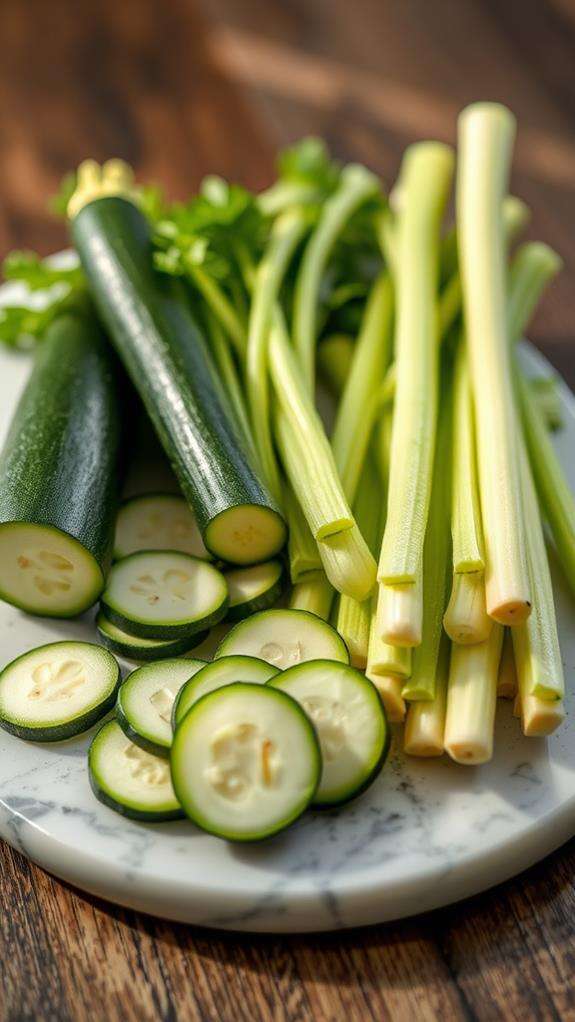
Moving beyond raw applications, these cucumber substitutes shine just as brightly in cooked dishes. When you're looking for a reasonable substitute in your cooking, zucchini stands out as your most versatile option. You'll find it performs exceptionally well in stir-fries, soups, and even baked dishes where cucumber might traditionally appear.
In our discussion about recipes, it's worth noting that celery brings a distinct flavor profile to cooked dishes, though you'll want to adjust your cooking time as it's typically firmer than cucumber. When sautéing, you can achieve similar results by cutting it on a bias and cooking until just tender. Jicama, while less common in cooked applications, maintains its crunch even when heated, making it perfect for quick stir-fries or brief cooking methods. You'll find that sliced radishes mellow considerably when cooked, losing their sharp bite while maintaining their pleasant texture. For dishes requiring a more delicate approach, Persian cucumbers can be lightly cooked, though you'll want to add them toward the end of cooking to preserve their tender-crisp texture.
Texture and Flavor Matches
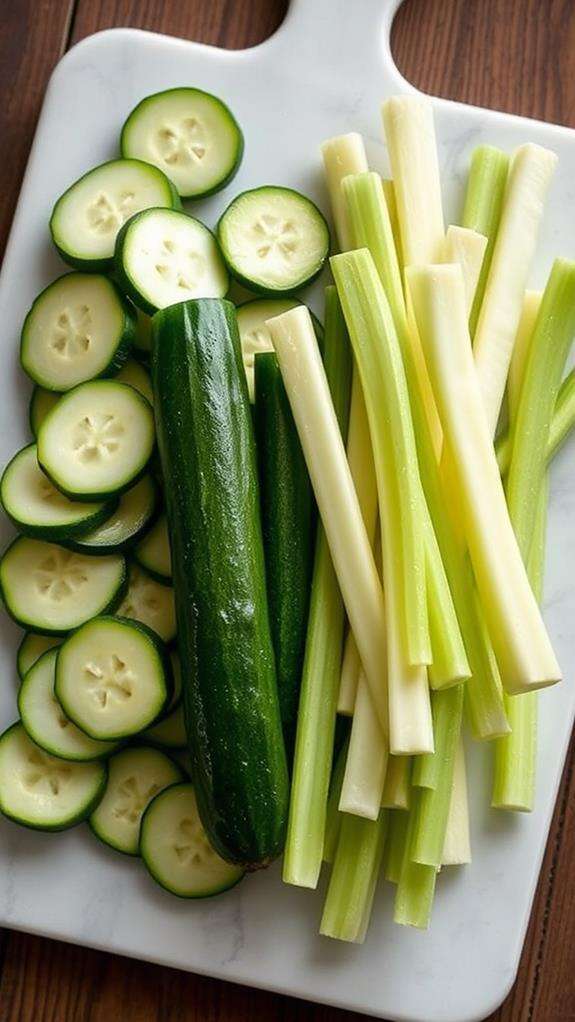
Finding the right texture and flavor match for cucumber requires understanding key substitutes that deliver similar sensory experiences. You'll discover that vegetables like celery and zucchini can replicate cucumber's distinctive crunch while maintaining the fresh, crisp qualities you're seeking in your dishes.
- When you need that signature crunch, celery steps in perfectly with its peppery undertones and satisfying texture that works especially well in sandwiches
- For recipes requiring moisture retention, zucchini delivers comparable water content and a mild flavor that won't overpower your other ingredients
- If you're looking for sweetness combined with crispness, jicama offers both while matching cucumber's invigorating qualities
- In salad applications, radishes provide that essential crunch while adding a pop of color and sharp flavor profile
You'll find that Persian cucumbers offer the closest match in both taste and texture to standard cucumbers, but when those aren't available, these alternatives will serve you well. Each substitute brings its own unique characteristics while maintaining the core textural elements that make cucumber such a versatile ingredient in various dishes.
Low Carb Cucumber Alternatives
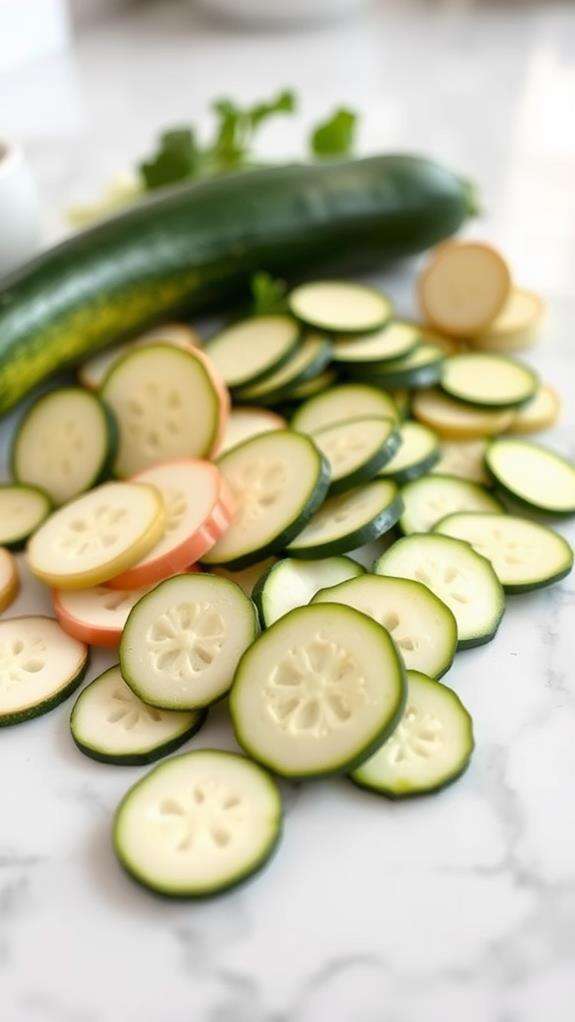
When you're following a low-carb or keto diet, finding the right cucumber substitutes can make all the difference in maintaining your carb limits while enjoying fresh, crunchy vegetables. You'll find excellent options in jicama and zucchini, which offer only 5 and 4 grams of carbs per cup respectively, making them perfect replacements in your favorite salads and snacks. For even lower carb counts, celery provides just 1 gram per stalk, while radishes and bell peppers round out your choices with their distinctive flavors and minimal carb impact.
Keto-Friendly Veggie Swaps
A wealth of keto-friendly vegetables can replace cucumbers while keeping your carb count low. When you're following a keto diet, it's crucial to find alternatives that won't disrupt your nutritional goals. You'll find that vegetables like zucchini and celery offer similar rejuvenating qualities while maintaining low-carb status.
- Try slicing raw zucchini into thin rounds for salads, as it provides a comparable crunch and moisture content to cucumbers.
- Replace cucumber with jicama in your wraps and slaws for a naturally sweet crunch that won't spike your blood sugar.
- Add thinly sliced fennel to your dishes for a unique flavor profile and satisfying texture.
- Consider radishes as a vibrant alternative, offering a peppery kick to your meals.
These keto-friendly swaps don't just maintain your low-carb lifestyle; they'll add variety to your meal planning. Celery, with its high water content, works particularly well in dips and fresh salads. You can mix and match these alternatives to create diverse textures and flavors in your dishes while staying firmly within your keto guidelines. Each option brings its own nutritional benefits while helping you maintain ketosis.
Crunch Without The Carbs
Low-carb lifestyles don't mean sacrificing the satisfying crunch you love in fresh vegetables. You'll find plenty of cucumber substitutes that deliver that invigorating snap while keeping your carb count in check.
For a reliable low-carb substitute, try celery's crisp texture in your favorite salads and snacks. Its high water content mirrors cucumber's invigorating quality, making it an excellent choice for everyday meals. You can also turn to jicama, which offers a naturally sweet crunch along with beneficial fiber, perfect for slicing into your favorite dishes.
When you're looking for versatility, zucchini steps up as a fantastic alternative. You can slice, grate, or spiral it to replace cucumber in everything from Greek salads to tzatziki sauce. For a pop of color and sharp flavor, radishes deliver that sought-after crunch with a peppery kick. If you're after something milder, shredded iceberg lettuce provides that characteristic crispness you're missing from cucumber, working particularly well in wraps and composed salads. These alternatives make sure you won't miss cucumber's texture while maintaining your low-carb eating plan.
Mediterranean Diet Friendly Options
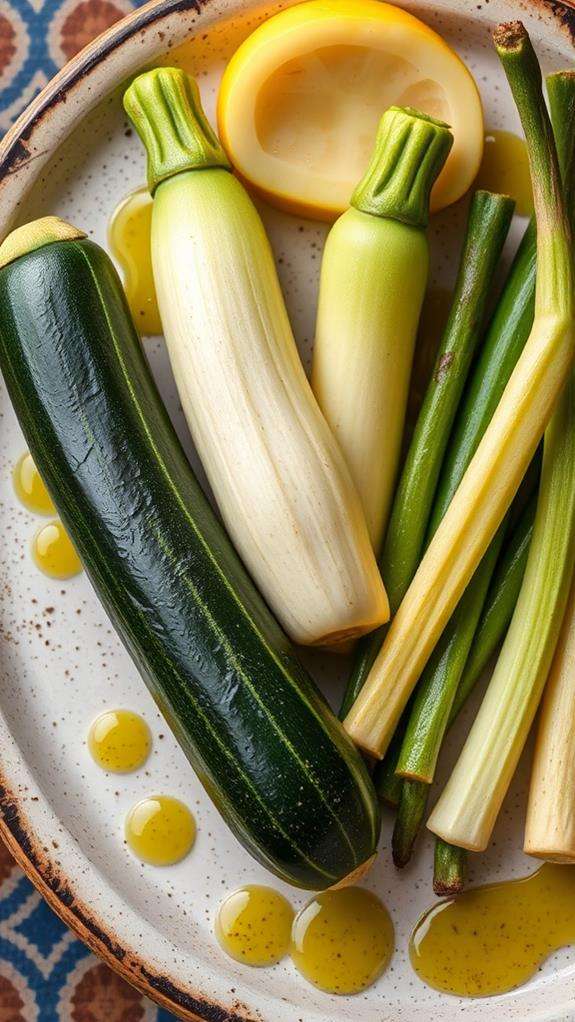
Several Mediterranean diet-friendly alternatives can replace cucumber while maintaining the fresh, vibrant essence of traditional dishes. When you're preparing traditional salads or tzatziki sauce, you'll find that celery offers that familiar cool crunch you're looking for, while keeping true to Mediterranean flavors. For those seeking variety in their Mediterranean meals, consider these proven alternatives that work particularly well:
- Zucchini, when grated fresh, provides similar moisture content and subtle flavor that won't overpower your dishes
- Persian cucumbers offer a sweeter, more intense flavor profile that enhances traditional recipes
- Jicama brings a unique crunch and subtle sweetness perfect for Mediterranean salads
- Bell peppers add vibrant color and mild sweetness while maintaining nutritional value
You'll find these substitutions especially useful when making classic Mediterranean salads, dips, and mezze platters. For instance, try mixing grated zucchini into your tzatziki sauce, or slice jicama thin for your Greek salad. These alternatives not only preserve the integrity of traditional Mediterranean dishes but also offer exciting variations that might become your new favorites.
Frequently Asked Questions
What Vegetable Is Similar to Cucumber?
Like dewdrops on morning leaves, you'll find several vegetables that mirror cucumber's invigorating essence. You'll discover zucchini matches cucumber's water content and crunch, while celery offers similar crispness with a peppery twist. Jicama brings sweet crunchiness to your plate, and Persian cucumbers provide a sweeter alternative. Don't forget radishes, which deliver that familiar crunch with an extra kick. Each option brings its unique character while maintaining cucumber-like qualities.
What Can I Use in Place of a Cucumber in a Salad?
You've got several tasty options to replace cucumber in your salad. Try using crisp celery stalks for that familiar crunch, or slice some zucchini thinly for a similar texture and water content. Jicama's sweet crunchiness works great too, while radishes can add a peppery kick to your dish. If you're looking to stay close to the original taste, Persian cucumbers are perfect since they're sweeter and crunchier than regular cucumbers.
What Herb Tastes Like Cucumber?
You'll find that mint is nature's green blessing that closely mimics cucumber's invigorating essence. It's widely recognized for sharing cucumber's cool, crisp profile in your dishes. When you're preparing salads or beverages, you can count on mint to deliver that familiar garden-fresh taste. You'll notice it works particularly well in Mediterranean dishes, and it's often used in tzatziki sauce as a complementary flavor alongside cucumber.
What Is the Same as Cucumber?
You'll find several foods that closely match cucumber's texture and crunch. Persian cucumbers are your closest match, offering a sweeter, crunchier profile than regular cucumbers. For alternatives, you can try celery, which provides similar coolness and crunch, or zucchini, which matches cucumber's water content. Jicama offers a comparable crisp texture with a light, sweet flavor, while radishes can give you that satisfying crunch with an extra peppery kick.





